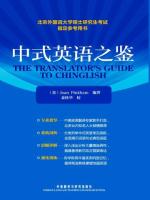review
AlsoWhite
Thoughts after Reading "Identifying Chinglish" On the
journey of learning English, we are often influenced by Chinese thinking
patterns, thus giving rise to Chinglish. The book "Identifying
Chinglish" is like a bright lamp, illuminating the right path for
us to use English correctly and enabling us to have a clearer
understanding of the characteristics of Chinglish and how to avoid it.
Firstly, the book deeply analyzes the causes of Chinglish. On the one
hand, there are huge differences between Chinese and English in grammar,
vocabulary, and expressions. When learning English, we often
unconsciously apply Chinese thinking patterns and expressions to
English, resulting in Chinglish. For example, Chinese often uses some
rather general and abstract words, while English tends to use specific
and definite ones. On the other hand, the lack of an English language
environment is also an important reason for the emergence of Chinglish.
If we don't have enough opportunities to be exposed to authentic
English, it will be very difficult for us to truly master English
expressions and habits. The book vividly demonstrates various
manifestations of Chinglish through a large number of examples. For
instance, in terms of vocabulary, Chinglish often involves literal
translations. For example, the Chinese sentence "好好学习,天天向上" is
literally translated as "Good good study, day day up", which
completely violates the grammar and expression habits in English. The
correct translation should be "Study hard and make progress every
day." In terms of grammar, Chinglish may have problems such as
subject-verb disagreement and tense errors. For example, the sentence
"我昨天去了超市,买了很多东西,今天我要去公园玩。" If translated as "I yesterday
went to the supermarket and bought a lot of things. Today I will go to
the park to play.", there are grammar mistakes. The correct
translation should be "I went to the supermarket yesterday and
bought a lot of things. Today I will go to the park to play."
Moreover, in terms of expressions, Chinglish may also seem rather stiff
and unnatural. For example, the sentence "请你把书递给我好吗?" If
translated as "Please you pass me the book, OK?", it is very
unidiomatic. The correct translation should be "Could you please
pass me the book?" Through reading this book, I deeply realize
the importance of identifying Chinglish. Only when we can accurately
identify Chinglish can we better avoid it and improve our English
expression level. When identifying Chinglish, we can start from the
following aspects. Firstly, we should compare the differences between
Chinese and English more and understand the grammar, vocabulary and
expressions of English. Secondly, we should read more authentic English
articles and books, watch English movies and TV series, etc., increase
our English language input and cultivate our English language sense. In
addition, we can communicate more with native English speakers and let
them help us correct mistakes and improve our English expression
ability. At the same time, this book also makes me understand that
learning English cannot just stay on the surface, but we should deeply
understand the cultural background of English-speaking countries.
Language and culture are inseparable. Only by understanding the culture
of English-speaking countries can we better understand and use English.
For example, in English-speaking countries, people often say "Thank
you very much." when expressing gratitude, while in China, we may
say "非常感谢你!". Although the meanings are the same, the
expressions are different. If we don't understand these cultural
differences, it will be easy to have misunderstandings in communication.
In conclusion, the book "Identifying Chinglish" has enabled me
to have a deeper understanding of Chinglish and provided me with many
methods to identify and avoid it. In my future study and life, I will
pay more attention to the correct expression of English and strive to
improve my English level and avoid the appearance of Chinglish. I
believe that as long as we persevere in learning and practice, we will
surely be able to master authentic English and communicate better with
the world.



 京公网安备 11010802032529号
京公网安备 11010802032529号